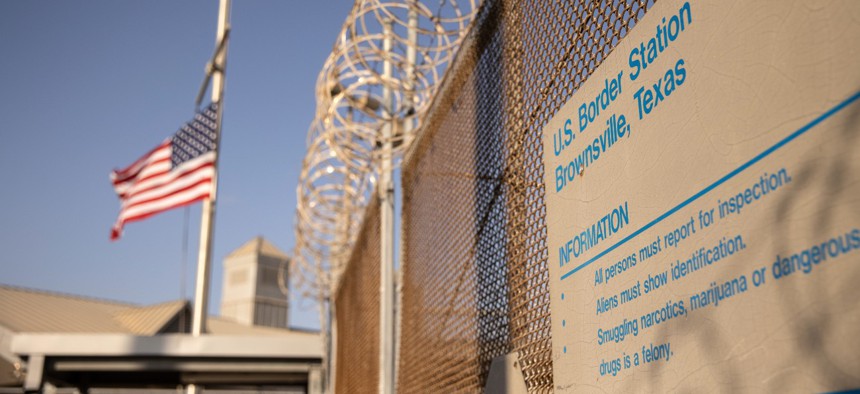
John Moore/Getty Images
DHS Prepares to Deploy Its Staff and Other Feds to the Border
The Biden administration says an increase in immigrants seeking entry into the country is likely after a pandemic policy is lifted.
The Biden administration is preparing for a significant uptick in immigrants crossing the U.S.-Mexico border ahead of a dramatic change in policy in place since the outset of the COVID-19 pandemic, in part by deploying federal personnel.
The Homeland Security Department will lead the effort, sending officers, agents and other staff throughout its workforce to address and process the anticipated increased stream of immigrants. DHS is taking the steps ahead of the upcoming end to Title 42 authority in which the U.S. has automatically rejected and turned away migrants arriving at the border to make asylum claims, ostensibly to prevent the spread of COVID-19. Encounters at the border have remained high despite the policy, but the administration is expecting the news of the end of the policy will lead to a renewed interest in individuals fleeing violence, unrest and poverty seeking to enter the country.
DHS has several times in recent years turned to its workforce to address swings in migration patterns, as well as other emergencies such as hurricane response and refugee processing. A year ago, Biden tapped the Emergency Management Agency to address a record increase in migrant children at the border. FEMA, Customs and Border Protection, Federal Protective Service, Immigration and Customs Enforcement and other DHS employees deployed through the department's Volunteer Force, staffed shelters, provided security and offered other support. The administration subsequently asked for volunteers across government to help an overwhelmed DHS and Health and Human Services Department in processing the children. Under President Trump in 2019, CBP reassigned thousands of customs officers from ports of entry to assist Border Patrol staff during a migration upswing.
Biden administration officials have repeatedly stressed they do not control when the Title 42 authority will be lifted, noting it is a public health law and reliant on a determination by the Centers for Disease Control and Prevention. Critics of the policy have noted thousands of individuals pass through ports of entry every day and the administration lifted the restrictions for unaccompanied minors shortly after taking office, raising questions as to whether its enforcement is really about COVID-19 concerns.
DHS said it has been planning for the policy's termination since the fall and has already repositioned some staff and activated its Volunteer Force personnel. The deployments will allow the department to "decompress points along the border and more efficiently process migrants," it said on Wednesday. CBP is standing up temporary processing centers, with Immigration and Customs Enforcement agents deployed to help staff them. DHS said it already anticipates requesting assistance from other agencies, even with new resources approved under the fiscal 2022 omnibus funding package.
The Biden administration recently issued a rule that will allow U.S. Citizenship and Immigration Services employees to make expedited asylum determinations. DHS vowed to quickly remove individuals whose claims are denied, though they will have appeal rights to the Justice Department's immigration court. In his just released budget, Biden is looking to dramatically increase the appropriated funds for normally fee-funded USCIS to enable it to hire thousands of new staff.
DHS provided analysis to reporters projecting three scenarios—that DHS personnel encounter either 6,000, 12,000 or 18,000 individuals per day after Title 42 authority is lifted—with contingency plans for each scenario. The department, which averaged 6,000 encounters per day in February, is planning to ramp up its transportation capacity to move newly arrived immigrants into the interior of the country as they await resolution to their cases.
Republican lawmakers sharply criticized the Biden administration’s approach, saying at a press conference Wednesday it was woefully unprepared for a potential immigration uptick. They called for Title 42 to remain in place until it develops a better plan.
"They have had a year to be able to plan for it, and they’ve chosen not to,” said Sen. James Lankford, R-Okla.







